
Alphabetical Menu
Chronological Menu
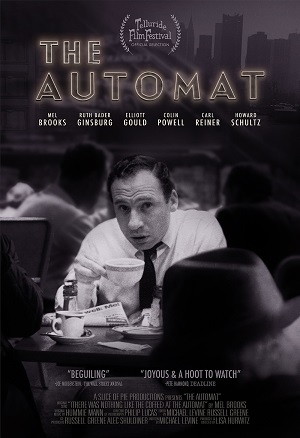
The Automat, directed by Lisa Hurwitz, charts the rise and fall of the Horn & Hardart Automat in the US. The first Automat opened in Philadelphia in 1902 and then expanded a decade later to New York City. Hurwitz interviews with a wide range of people, such as Ruth Bader Ginsberg, Colin Powell, Elliott Gould, Carl Reiner and Mel Brooks, who fondly recall their memories of the Automat. If you're too young to have heard of or experienced the Automat, Mel Brooks describes it vividly with great attention to detail. He even remembers what the lady who exchanged a dollar for nickels there was like. There are even some amusing anecdotes. You'll learn about the origins of the Automat and what makes it so significant. RBG hits the nail on the head when she describes it as a place where people from all walks of life could come together, regardless of religion, race and even class. It was a melting pot that represented democracy at its finest. Howard Schultz, former CEO of Starbucks, talks about how the Automat influenced Starbucks. The food and drinks were served quickly at cheap prices without wait service. Their delicious coffee cost only a nickel. Eventually that changed, though, as Horn & Hardart tried to expand and had to raise their prices. Coffee suddenly cost 10 cents instead of 5 cents. As prices went up, demand went down and it never went back to normal after that. Hurwitz doesn't focus too much on the Automat's downfall, but she doesn't gloss over it either. She also interviews Paul Hardart, the great-grandson of Frank Hardart, one of the founders of Horn & Hardart. Clips from black-and-white movies from the Golden Age of Hollywood featuring the Automat help to bring it to life while showing how it became part of the cultural zeitgeist back then. The Automat serves as an insightful, moving and nostalgic trip down memory lane that sheds light iconic landmark while also serving as a bittersweet reminder that every beginning has an end. Nothing that seems too good to be true lasts forever, but the memories are there and can now be shared with future generations thanks to The Automat. By the end of this enormously entertaining, delightful and illuminating doc, which clocks just 1 hour and 19 minutes, there's no doubt that there's nothing quite like the Automat today. It opens at Film Forum via Slice of Pie Productions.
A Banquet 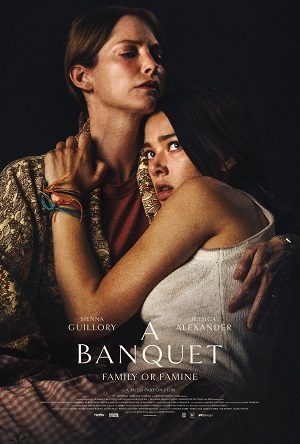 Betsey (Jessica Alexander), a teenager, lives with her widowed mother, Holly (Sienna Guillory), and younger sister, Isabelle (Ruby Stokes). After a night of partying, Betsey experiences something strange in the woods and no longer behaves the same way that she did before. She suddenly stops eating without losing any weight. Her mother prepares plenty of meals for her and even asks her to just eat a few peas at the dinner table, but she refuses to. Meanwhile, her grandmother, June (Lindsay Duncan), visits and tries to convince Betsey that she's faking a physical illness for attention and is mentally ill. A Banquet is a slow-burning psychological horror film. The screenplay by Justin Bull doesn't offer easy answers as it lets the audience decide if Betsey's illness has a supernatural element to it or not. He uses exposition very carefully without revealing too much too soon. Even what exactly happened to Betsey in the woods remains a mystery, but what's clear is that she's not the same after that point. The relationship between her and her mother also changes. Who's the real villain? That's not very clear. Holly shows signs that she's not a great parent by invalidating her daughter's feelings and lashing out at her, but she's justifiably frustrated. When June shows up, that's when the film becomes more interesting because you learn about Holly's relationship with her mother and something that her mother tried to cover up. Without using flashbacks, director Ruth Paxton and screenwriter Justin Bill provide the audience with a little backstory that explains some of what's going on with Betsey, but not everything. Perhaps A Banquet is really about a dysfunctional family that harbors dark secrets from their past which threaten to break the family apart. What Betsey experiences can be taken literally or figuratively. Even the third act that adds another layer of complexity leaves some room for interpretation without over-explaining or trying to be too subversive like in the painfully lazy film The Turning. Compared to The Turning, A Banquet is a masterpiece. It's not as scary or brilliant as Rosemary's Baby nor does it get as grim or twisted as Hereditary, but it comes close. On an aesthetic level, A Banquet excels with visual poetry that combines lighting, color, editing and camera angles that add both style and substance. The images of the food that Holly serves Betsey look quite creepy and disgusting. This isn't a foodie movie at all despite all the food that's shown. The terrific sound design and visual effects are also worth mentioning, but keep in mind that A Banquet does not rely on those elements to entertain the audience. Nor does it rely on jump scares either which is quite refreshing. The performances are all solid, with Lindsay Duncan adding plenty of gravitas while making the most out of her supporting role. At a running time of 1 hour and 37 minutes, A Banquet is a poetic, gripping and creepy slice of psychological horror. It would make for a good double feature with Relic. 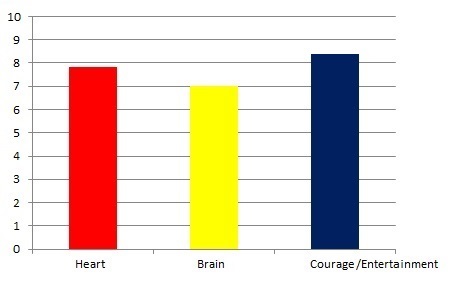 The Cursed 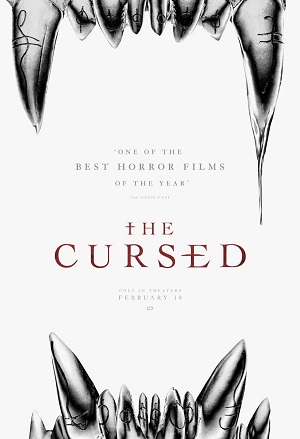 In the later 19th Century, John (Boyd Holbrook), a pathologist, arrives at a small village to investigate strange attacks by a creature that terrorizes the villagers. The creature bites Edward (Max Mackintosh), the young son of Seamus (Alistair Petrie) and Isabelle (Kelly Reilly). Edward immediately becomes very ill before he vanishes into the woods. Writer/director Sean Ellis has woven a compelling narrative that combines horror, mystery, action and drama very effectively. He doesn't begin the film by jumping right into the meat of the story, but instead starts with a prologue set during World War I that throws the audience right into a battle with no exposition. That opening scene might be confusing at first because of that lack of exposition, but patient audiences will be rewarded because it becomes clearer and more significant later on, especially a silver bullet that a doctor extracts from a soldier's body. Then the film flashes back a few decades to the story of John, Seamus, Isabelle and Edward in the village. Isabelle has scars on her back which were most likely caused by the creature that terrorizes the village. What's the creature? Why does it terrorize the village? What happens to the victims after the creature bites them? What happened to Edward? Writer/director Sean Ellis takes his time to answer those questions so, again, he trusts the audience's patience. Fortunately, he maintains a foreboding and grim tone without veering into uneven territory with outrageous humor (I'm looking at you, Lamb) or relying heavily on gore instead of a compelling story (I'm looking at you Antlers) or showing too much of the creature itself without leaving room for the audience's imagination (I'm looking at you again, Antlers. The Cursed could've easily become repetitive, dull and/or shallow with a less intelligent, sensitive screenplay, but the screenplay always adds new layers of complexities and revelations to the story as it progresses that make it increasingly intriguing. It even has a few scary scenes while it also relies on the audience's imagination which leads to even more genuinely palpable scares. Concurrently, Ellis keeps the film emotionally resonating because he treats the characters like human beings while grounding the film even further in realism. The cinematography, set design and lighting as well as the landscape come together to create a film rich in atmosphere which helps to set the tone and to create an immersive experience. The DP, fortunately, doesn't shake the camera to create tension and grasps that the tension comes from the story itself, so the camera doesn't need to be shaken to generate tension. This isn't The Blair Witch Project, after all. The pace moves slow, but not too slow like in The VVitch or in the overrated Midsommar. A huge part of what helps to set the tone and to keep the film engrossing as well is the talented cast, particularly Boyd Holbrook who's quite charismatic and the underrated Kelly Reilly who gives an emotionally convincing, understated performance. At a running time of 1 hour and 53 minutes, which is just the right length, The Cursed manages to be genuinely scary, engrossing and captivating. 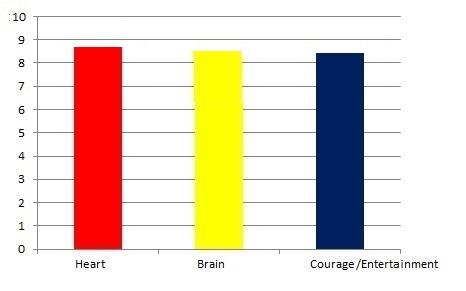 Dog  Briggs (Channing Tatum), a former Army Ranger suffering from a brain injury, wants to return to the army, but he can't until he completes a seemingly simple mission. He has to drive down the Pacific coast to transport Lulu, a dog, to the funeral of her owner, Riley Rodriguez (Eric Urbiztondo), a soldier who recently died. The road trip doesn't go as smoothly as he expects it to. The screenplay by writer/director Reid Carolin and co-writer Brett Rodriguez bites off more than it could chew. Part road trip adventure, part buddy dramedy, part drama and character study, it tries too hard to please everyone, but ends up pleasing very few. The "comedy" is mostly in the form of comic relief, so to call Dog anything near a comedy would be unfair, and the attempts at humor rarely land. Briggs meets with strangers along the way including two women who offer him a threesome in one of the most random scenes that feels like it should've ended up on the editing room floor. He also meets an eccentric couple, Tamara (Jane Adams), a psychic, and her husband Gus (Kevin Nash), a pot farmer. Briggs goes to the extent of pretending that he's a blind war veteran with a seeing eye dog to get a free hotel room. Is that supposed to be funny in a screwball sort of way? It's not; it makes Briggs seem like an unreliable, sleazy jerk. Meanwhile, he bonds with the dog along the way, but Dog doesn't succeed at being a moving or profound exploration of a friendship between a man and a dog, so the ending doesn't quite earn its uplift and feels contrived. Instead, it's both dull and even a bit schmaltzy. The performances are decent at best, but no one stands out. Channing Tatum is a fine actor when working with a good script; here he fails to tap into the inner life of Briggs, so by the end of the film, the audience doesn't get to know Briggs any more than they already did at the beginning. Also, Dog suffers from pacing issues and some scenes that last too long while others that are too short. The scenery of the Pacific coastline does provide something to be engaged by at least on aesthetic level, and the music is quite lively, but that's not nearly enough to elevate Dog above mediocrity. At a running time of 1 hour and 41 minutes, which feels more like 2 hours, Dog is contrived, uneven, clunky and ultimately underwhelming. 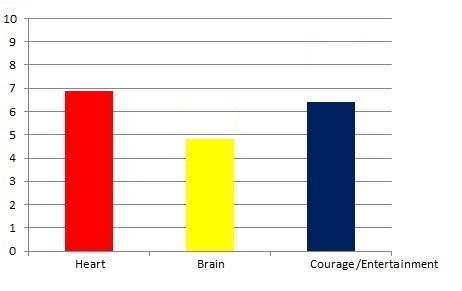 The Ledge 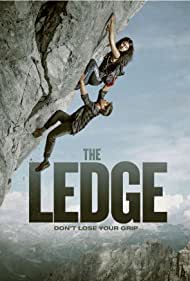 Kelly (Brittany Ashworth) and her friend, Sophie (Anais Parello), go mountain climbing together when they befriend a group of guys, Joshua (Ben Lamb), Reynolds (Nathan Welsh), Nathan (Louis Boyer) and Taylor (David Wayman) and drink with them by a campfire. Joshua kills Sophie, but Kelly recorded the crime with a video camera. She takes the camera and climbs the face of the mountain to try to escape the guys as they chase her. The Ledge suffers from a tedious, wafer-thin narrative that's too low on thrills, suspense and surprise. The screenplay by Tom Boyle takes a while to build even a little bit of tension with a first act that introduces the dull characters none of which come to life, even as they sit by the campfire to talk. They barely talk before Joshua gets angry at something that Sophie says and pushes her off the mountain. It's at that point that The Ledge takes a nosedive as it becomes a cat-and-mouse chase on the mountain before coming to a standstill when Kelly finds a safe spot to escape on the face of the mountain. Even though that concept sounds like it could be an edge-of-your-seat experience, screenwriter Tom Boyle and director Howard J. Ford don't do an effective job of taking the concept anywhere interesting nor do they create enough palpable suspense. Unfortunately, the villain is boring and forgettable. The heroine, Kelly, is strong, both physically and emotionally, but it's that last part that the film neglects to explore because the screenplay fails to get inside Kelly's head to humanize her. Moreover, the brief flashbacks feel clunky and distracting. If the audience were to get to know her more, they'd care about what happens to her and feel like they're there with her for the ride. Instead, the audience remains at a cold distance from Kelly, so she still remains somewhat of a stranger to them by the time the end credits roll. There's enough material for horror elements and psychological horror, too, but the filmmakers squander those opportunities as well. Would it hurt to include just a little bit of comic relief every now and then? Every film, even war films, need some levity which The Ledge doesn't even have. The acting is decent at best, but nothing to write home about or to elevate the film, no pun intended. The same can be said about the scenery, the cinematography, and editing. They're fine without standing out in any way. Sometimes a film's lack of substance can be forgiven if there's enough style to compensate for it or if the landscape becomes a character in itself, but that's not the case with The Ledge. There are far more terrifying, shocking and riveting survival thrillers that take far more risks, i.e. High Tension, The Descent and The Revenant. At a running time of 1 hour and 26 minutes, which feels more like 2 hours, The Ledge is tedious, vapid and, much like its dull title, unimaginative. 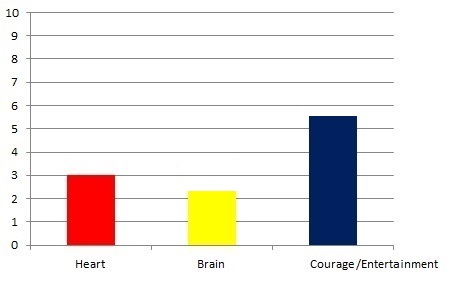 Strawberry Mansion 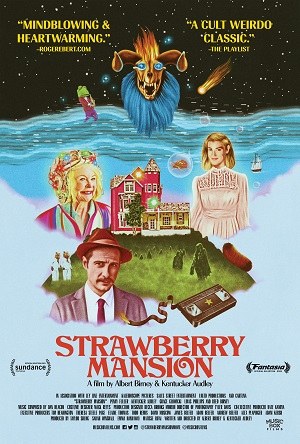 In the year 2035, the government collects taxes on the dreams of its citizens. James Preble (Kentucker Audley) works as a taxman who must audit the dreams of Bella Isadora (Penny Fuller), an older woman estranged from her son, Peter (Reed Birney), and grandson, Brian (Ephraim Birney). Her taxes are long overdue and still uses analog which the government has banned. He falls in love with the younger version (Grace Glowicki) of Bella he meets in her dreams. Strawberry Mansion is the kind of film that to describe its plot wouldn't do it any justice. Co-writer/directors Kentucker Audley and Albert Birney throw logic and convention out the window as they combine sci-fi, romance, drama and dark comedy with some campiness and tongue-in-cheek humor. If you can imagine something like Nine Days crossed with the films of John Waters, David Lynch and Michel Gondry, you'll get something along the lines of Strawberry Mansion. The amalgam of different offbeat tones is similar to the tones in Greener Grass and Knives and Skin. It gets very bizarre and trippy at times and doesn't make much sense, but it doesn't try to either. There's not much exposition, and just when you think the film is going in one direction, it goes in another. That unpredictability makes it refreshing, suspenseful and engaging on a visceral level. To be fair though, the off-kilter plot does become a bit exhausting and even a bit nauseating around the hour mark especially because it seems like it's trying too hard to be outrageous, bold and subversive just for the sake of being outrageous, bold and subversive. The comedic beats don't always land, and when the film aims for poignancy, it feels contrived and tacked-on. That said, the filmmakers do have a pretty good command when it comes to mixing tones in a way that's far from dull. The visual effects and cinematography are both Strawberry Mansion's greatest assets. Everything from the production design to the colors, the lighting, the music and the camera work bring plenty of style to the film. Unfortunately, that style doesn't always compensate for the lack of substance. Also, the use of symbolism, i.e. the spider infestation becomes repetitive and hits the audience over the head. Those images of spiders tease the audience with horror and creepiness. David Lynch incuded a spider in Lost Highway, but he didn't overdo it like Kentucker Audley and ALbert Birney do with that creepy imagery. At a running time of 1 hour and 31 minutes, Strawberry Mansion is a trippy, bold and refreshingly unconventional, but ultimately shallow, tedious and exhausting. 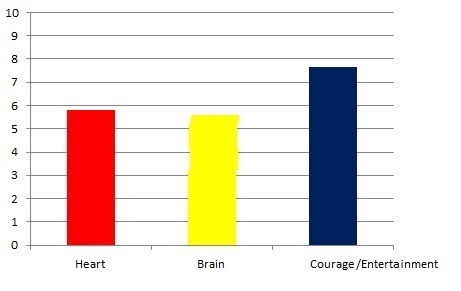 Ted K 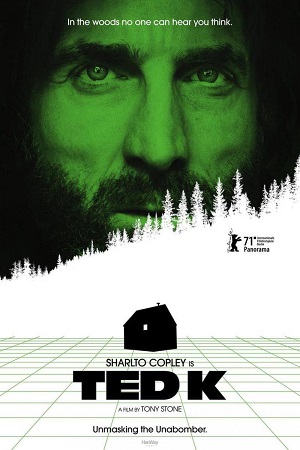 Ted Kaczynksi (Sharlto Copley) lives alone in an isolated cabin deep in the woods of Lincoln, Montana. He gradually loses his mind as he sends bombs through the mail to key individuals he believes are destroying humanity and the environment. Ted K isn't a conventional biopic of Ted Kaczynksi much like Spencer isn't a conventional biopic of Princess Diana. Writer/director Tony Stone along with co-writers Gaddy Davis and John Rosenthal provide a glimpse into 7 years leading up to Kaczynksi's capture as the Unabomber. There's virtually no exposition and no use of flashbacks to show what he was like before moving to the woods. He has a dysfunctional relationship with his mother whom he briefly calls on a payphone, and he keeps to himself most of the time. There's a general sense of unease about him that makes him seem like a ticking time bomb because he has a lot of pent-up rage at the world. How he views himself is a whole other matter because this film doesn't really try to explore or explain him; just to observe him. Notice that the title doesn't even spell out Ted's last name which probably symbolizes the fact that this isn't a complete biopic. It's essentially an impressionistic snapshot that uses the audience's imagination more often than not to generate tension. The filmmakers put the hunt for Kaczynksi on the sidelines and just focus on his life in the woods of Montana. The suspense is there, but it's understated and muted. The horror is there too, but it's found in the audience's imagination rather than onscreen, except for the scenes when Kaczynksi builds the bombs and mails them. Even the third act with his inevitable capture feels a bit anticlimactic and doesn't show him in prison, nor does it need to because the filmmakers trust that the audience will fill in the gaps themselves. They humanize him, but they don't judge him; they let the audience do the judging as they see him going about his daily life. The only clunky scenes are the dream sequences that interrupt the film briefly. Sharlto Copley is very well cast and gives a convincingly moving performance in the lead role. He's the movie's heart, mind and soul, so he helps to bring the character to life, even during the quiet moments. Thanks to Copley's transformative performance which also includes a realistic-looking beard, you get a sense of the anger, frustration and sadness lurking beneath the surface of Kaczynksi. Ted K doesn't dig too deep beneath the surface, though, nor does it have anything profound to say about madness or evil, but it's nonetheless an emotionally gripping experience. The cinematography along with the scenery and an interesting use of Vivaldi's Summer from Four Seasons also helps to add some additional depth through sound and visuals alone. Concurrently, the slow pace allows the audience to gradually become absorbed and immersed in Kaczynksi's life. At a running time of 2 hours, Ted K is a slow-burning, quietly engrossing and understated glimpse inside the mind of a madman. 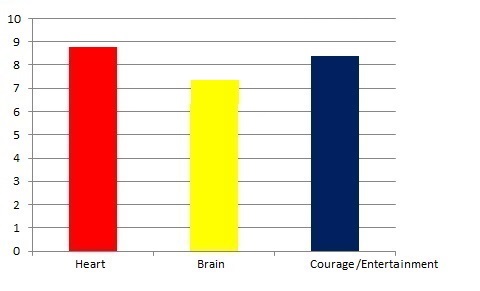 Too Cool to Kill 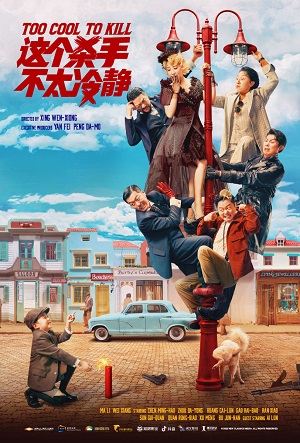 A gangster, Mr. Harvey (Minghao Chen), wants to find the mysterious hitman just known as Killer Karl who tried, but failed, to assassinate him. Mr. Harvey also produces a movie that Miller (Lun Ai) directs. Just as he's about to shut down the production because of the director's past films flopped, actress Milan (Li Ma), Miller's sister hatches a plan to trick Mr. Harvey into thinking that she has found Killer Karl. She goes to a gullible extra, Wei Chenggong (Xiang Wei), who's very eager to play a lead role, and offers him to be cast in a film as Karl without him knowing that the film doesn't exist. He enthusiastically agrees and even accepts the fact that there's no script or visible cameras. Too Cool to Kill is a hilarious and delightfully zany screwball comedy that never takes itself too seriously. The screenplay by Xing Wenxiong brims with witty dialogue as it blends action, suspense, dark humor and farce with no signs of tonal unevenness. That alone is a testament to the strengths of its screenplay. Wenxiong not only uses an outrageously funny concept, but also knows how to make the most of it and to take it to interesting places. With a less imaginative screenplay, it would've felt repetitive and eventually lost momentum; that's not at all the case with Too Cool to Kill, though. It always feels invigorating and has some laughs without resorting to the lowest common denominator. The suspense derives from two aspects of the plot: whether or not Wei Chenggong will realize that he's been duped, and whether or not Mr. Harvey will realize that Wei Chenggong isn't actually Killer Karl. The lengths that Miller and his sister, Milan, go through to trick Wei and Mr. Harvey are both clever and amusing. Even the third act, which is usually when a film takes a nosedive, still manages to be wildly entertaining without going too over-the-top. Part of what makes Too Cool to Kill so delightful is that its cast seem to be having such a great time on screen, so that fun transfers right to the audience. Xiang Wei, in particular, has terrific comedic timing, but everyone gets a chance to shine. The production values including the set design, lighting, costume design, hair & makeup are also impressive and add plenty of style. The best way to describe Too Cool to Kill is that it's like Bowfinger with a little bit of Stephen Chow's zaniness thrown in. It even has shades of Francis Veber's classic french screwball comedies like Le Chevre or The Dinner Game. Like the great Francis Veber, director Wenxiong has a knack for making a crowd-pleasing comedy that's refreshing, witty and funny from start to finish. At a running time of 1 hour and 49 minutes, it's the best gangster comedy since Analyze This. 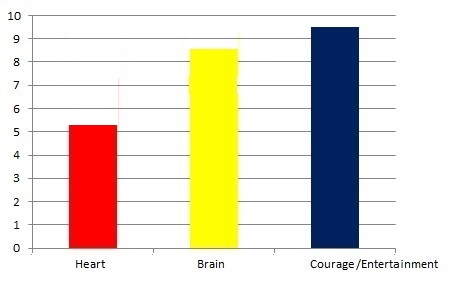 Uncharted 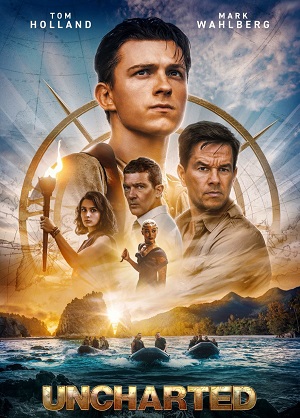 Nathan Drake (Tom Holland) works as a bartender in New York City and hasn't been in touch with his older brother, Sam (Rudy Pankow), in years. Victor “Sully” Sullivan (Mark Wahlberg), a treasure hunter who had once worked with Sam, tracks Nathan down and persuades him to join him on a quest to find the treasure that Ferdinand Magellan's ships had 500 years ago. Chloe Frazer (Sophia Ali) teams up with them on the hunt for the gold. Meanwhile, the nefarious Santiago Moncada (Antonio Banderas) and his mercenary Jo Braddock (Tati Gabrielle) have their own plans to find the treasure while killing anyone who gets in their way. Uncharted is based on a video game and perhaps should've stayed a video game because as a movie, it's a tonally uneven mess that has shades of better action adventures like Indiana Jones and Pirates of the Caribbean. Even Jungle Cruise feels more fun and exciting. The screenplay has three writers, namely, Rafe Judkins, Art Marcum and Matt Holloway, but none of them manage to inject enough wit or humor into the film which takes itself too seriously. Nathan, Sully and Chloe don't get enough chances to bond as a team, and they don't have much chemistry either. They essentially feel like they're just there to move the plot forward rather than fully-fleshed human beings. There's some backstory involving Nathan and his rocky relationship with his brother, but that remains underexplored. It's disappointing that the villain, Santiago Mancada, is cartoonish and one-dimensional without enough of a backstory to make him more than just a generic, cookie-cutter villain. To be fair, there are a few sporadic thrills, i.e. a heist that takes place during an auction. That's not enough, though, to invigorate the film that begins to lose steam around the hour mark and doesn't regain any of its steam during the rushed and unsurprising third act. If you're looking for a more surprising, exhilarating and even heartfelt Tom Holland film, just watch or rewatch Spider-Man: No Way Home instead. Tom Holland is a very charismatic actor who's capable of handling scenes with emotional depth as he displayed in Spider-Man: No Way Home. In Uncharted, he's undermined by a shallow screenplay that doesn't provide him enough chances to show his dramatic skills. His pairing with Mark Wahlberg doesn't quite work, but that's mostly likely the fault of the screenplay, again. The same goes for Tom Holland and Sophia Ali because their pairing also falls flat. Uncharted will make you yearn for the more captivating scenes with him and Zendaya in Spider-Man: Far From Home. The CGI effects are pretty impressive, though, so it's obvious where a lot of the budget went to. There's plenty of eye candy, but not enough candy for the heart, mind and soul, basically. The only "candy" for the mind is when you're wondering how Nathan's hair doesn't get messy even after a long action sequence in the third act. He must have super strong hair gel or perhaps that's his superpower. At a running time of 1 hour and 56 minutes, is a lackluster action adventure that takes itself too seriously while lacking palpable thrills, suspense and surprises. 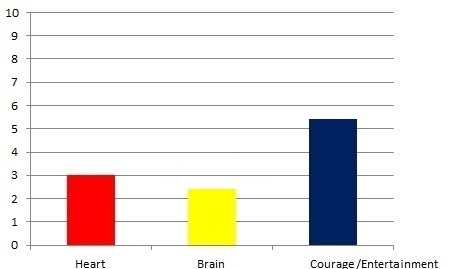 |